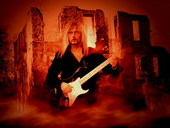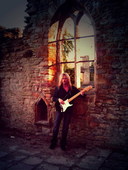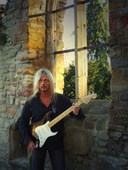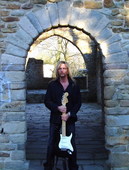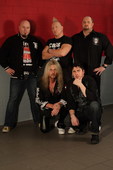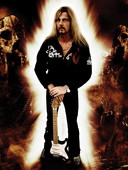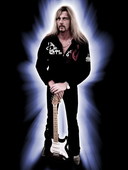Axel Rudi Pell
I Have Never Changed My Style
02.12.2011
Архив интервью | Русская версияGerman guitarist Axel Rudi Pell is remarkable for his extreme productivity. Over 22 years of his solo career he has put out a total of 26 releases (studio and live CDs, DVDs, ballads and covers compilations). And though not all of them are excellent or boundary-breaking, such stability can be treated with nothing but respect. In other words, Axel never lets his fans down, and the others can follow the popular saying – take it or leave it. We hooked up with Axel to discuss his another ballads compilation, already the fourth installment of the series. But of course, we couldn’t but take a look at the outstanding musician’s history and various projects…
Let’s discuss your latest release, “The Ballads IV”. Who came up with the idea that now it’s the right time to release this compilation? Was it your idea or was it your label’s idea?
Well, that was my idea because we are doing it every once in a while. Every six or seven years we are releasing another ballad compilation, and the last one, “The Ballads III”, was released in 2004. Seven years are already over, and there are a lot of great ballads on my newer albums, so I think it’s the right time to release the next one.
Looking at your discography we noticed that you release something every year – albums, compilations, DVDs, live CDs. Is it a kind of your strategy in the music business?
Yes, definitely! Fans are screaming for new stuff, you know. They are screaming, “Will “The Ballads” will be out this year?” They are asking, “When will you release a new album? Why don’t you release another live CD or DVD?” They want it and they’ve got it. (laughs)
Please tell us about the new songs which contain this compilation. We’re especially interested why you picked up Dio’s “Holy Diver” and re-arranged it so much.
Ronnie was a friend of mine, I met him several times – I don’t know for how many years I knew him. I always was a big admirer of his voice, his style of writing and his lyrics. At one point I said to myself, “We are doing this ballad compilation, and Ronnie is no longer with us, so we have to have one of my favorite songs by Ronnie”. I didn’t want to record a ballad, which was a ballad before. It would have been very easy to pick, for example, “Catch The Rainbow” by Rainbow and do a ballad out of it, but it was a ballad before. So I said to myself, “It has to be a different one”. We re-arranged it so much, but you can still hear the great melody in it. We added some cello in there and some orchestra to the chorus. I think the outcome is good enough, and I’m really proud of it.
It was announced that you will shoot a video clip for the song “Hallelujah” which seems to be the very first time you’re doing a video in the past ten or even more years. Why did you decide finally to do a video?
Because the record company wants to have it, too. (laughs) “Hallelujah” is a very-very commercial song. It’s all over the place, you can hear it on the radio and from other artists, too, but I think our version is in Top 3 or even Top 2, I really love it and Johnny (Gioeli) put everything vocal-wise into that song. My record company said, “We’re doing a videoclip for that, because this is our big chance to get to a wider audience, to appeal to more people”.
So will they this video on German TV?
I hope so. I think it will be on a few stations like VOX or DMAX in a couple of months.
Many of your albums were produced by Charlie Bauerfiend and a lot of musicians who used to work with him describe Charlie is a quite demanding person to work with. What can you say about his way of producing?
He is a beast. (everybody laughs) No, Charlie is a really nice guy. It’s very easy to work with him because he is perfect in what he’s doing. He is very good at his computers, he’s perfect in working with the Pro-Tools system which I use a lot in the recording process. He’s always a nice guy, and he’s really perfect for me. He knows exactly what I want. When I try, when I go over the top over a guitar solo, he says, “You have to calm down, you have to recreate it”. I would say, “Wow, it’s fucking great!” and he says, “No, it’s not, you can do it better”. There’s been chemistry between us for a few years.
Well, you’ve been working with the constant line-up for the past 11 years or something and before of that you had quite a lot of changes among the musicians that you were worked with. Can you reveal the secret of having such a stable collaboration with people who you are working at the moment?
They pay me good money! (laughs)
They pay you?
No, I’m kidding. The reason is this line-up is really perfect for my style, for what I’m playing at the moment. I think it fits perfectly, and we also became friends over the years. The reason behind this magic thing is that we don’t see each other very often, we are not in the rehearsal room and rehearsing two or three times a week. We can’t do it because Johnny is still living in the USA, and Mike (Terrana) is traveling all over the world with Tarja Turunen and his solo project. Even Ferdy (Doernberg), the keyboard player, he lives in Germany, but it’s a 3.5 hours drive from here. We don’t see each other very often, and that’s the reason why it works. When we are in the rehearsal room rehearsing for the tour or when we do a record, it’s good to see each other again, everybody loves each other, everybody says “Wow, this is great to see you again!” and always makes jokes.
All the singers in your solo band are Americans. What’s wrong with European guys? Does it mean that nobody in Europe can sing your songs?
You know, for me it was quite easy. I always searched for the right voice for my project, and I always had Johnny in mind because when the first Hardline record came out in 1992, I said “Wow, this is real good! From which country is this band?” I looked it up, and they were from the United States. So Johnny was number one on my list when Jeff Scott Sotto left the band. I think it has something to do with my style, I don’t know how to describe it. With Mike Terrana it was the same. He was in Europe looking for a job and he gave me a call. It was actually not he, I got a call from Roland Grapow, the former guitar player of Helloween, and he said “Axel, I have a nice drummer here, he’s very talented, he worked for Yngwie Malmsteen and stuff, and he is looking for another job”. I said “Give me his number because I’m looking for a drummer!” It had nothing to do with whether this guy was from America or from Russia, or from Portugal or from Spain. As long as these people fit perfectly to my kind of music, it’s great.
On your previous album “The Crest” (2010) you recorded the song “Dark Waves Of The Sea”, a kind of continuation of the song “Oceans Of Time”. Why did you decide to return to this theme once again?
Originally that was the idea of my record company. They said “Axel, what do you think about calling the next album “Oceans Of Time part 2?” I said “I don’t like it, because this record will be so strong that it stands for itself”. But during the writing process I played a riff, wrote this song based on it, and somehow it came to my mind, “Hey, the chorus of “Oceans Of Time” fits perfectly to that song!” I said, “Let’s put it together, this is good idea”. It worked quite well, I think.
By the way, “The Crest” got into the charts of many European countries. Does it mean anything for you?
Definitely, you could see if the band is popular or not if it’s in the charts of if it’s not. For me it’s quite different, you know. In Germany, for example, when there is a good week, and not so many big records by famous artists are out, you have a big chance to go to Top-30 or even Top-20. But maybe when you sell the same amount of records one or two weeks later, another artist will release an album, and you will only be in Top 40 or 60. It’s a kind of strange system in Germany, the way they’re counting which place you are on. For me it’s quite OK, hopefully we’ll be in Top-20 very soon or maybe even in Top-10.
You have quite an extensive discography with a lot of albums behind you. Have you ever considered re-recording something from your old albums, for instance, “Wild Obsession” (1989), with the current line-up?
No., I don’t like that idea. I think we already did it for “The Ballads II”, when we made an acoustic version of “The Clown Is Dead”, but the reason why we re-recorded it was that the first version of that song was so long, it was 14 or 15 minutes, so we did a shorter version and re-recorded it with a different arrangement. But I’m not the friend of this, I’m only thinking, “This is a thing from the past”, and I have so many new ideas for new songs that it’s not necessary to re-record the older ones.
Everybody who’s into heavy music knows your music is easy recognizable but a lot of people still draw comparisons between the music that you are doing and the old music of Rainbow. What can you say about these comparisons? Are they flattering you or maybe you hated it over the years?
I think sometimes people are right and sometimes they are not. Some progressions of the chords, some harmonies are in typical Rainbow style, but it’s not everything that I have done. For example, the record “Tales Of The Crown”, which I did in 2008, has nothing to do with Rainbow, it was a little bit different. But the last one, “The Crest”, was more in the Rainbow style definitely. I grew up with this music and definitely it is one of my biggest influences of all time. Sometimes it shows up through my songwriting and sometimes it doesn’t, it’s a little bit different. But you know, to me it’s ok, because Ritchie Blackmore is one of my heroes.
Once you said Ritchie Blackmore inspired you to be a guitarist and you wanted to crash your guitar on stage like he did. Have you ever use a chance to crash a guitar on stage?
Yes, but I’ve never had a chance to crash a guitar on Ritchie’s head. (everybody laughs). Once in a while I tried to crash a guitar. At one point, when Jeff Scott Soto was in the band, I think it was 1995, I crashed the guitar on stage, the neck crashed first, but it didn’t break, the strings were still on, and the neck were directly to my head. There was a big boom, and I fell down. I said to myself, “From this point on I will never crash a guitar on stage, I can’t do it, it’s a dangerous for me”. (laughs)
Your albums from “Oceans Of Time” (1998) to “Kings And Queens” (2004) are kind of connected by a single concept. And what about later albums? Do they have anything to do with that concept?
The concept is still going on and it will be on the next record too. There are always those five persons or maybe sometimes only two persons on the cover, and they are going to travel to different mystical eras or universes. They are going back and forth in time, for example, the cover of “Kings And Queens” shows the Middle Ages, some time between the years 1100 and 1300, that’s the period that inspired that record. And the subsequent record (“Mystica”, 2006) is connected to the later period, somewhere between 1500 and 1600. But you always see these guys who continue going after the crown which was stolen by the evil. On “The Crest” they had finally have the crown back in their hands, it’s in the chapel. On the cover of “The Crest” you see two knights with the swords, they are fighting the evil because somebody tries to get in the castle and get the crown back.
The booklet of “The Crest” reads your wife Christine had to deal with all your moods during the songwriting process. Can you say a few words about this process? What is the most difficult thing for you when it comes to songwriting?
The most difficult thing for me is to write the lyrics. When I’m writing I’m always collecting the stuff over a period of several months – I’m collecting riffs, hook lines, vocal melodies, etc.. And then I sit down for probably three weeks in my working room. I sit on a couch with a guitar in my hands and my recording machine and I try to combine all those snippets, all those different parts. Sometimes it works and sometimes not. And when it works, I’m great. I come down to my wife and say, “Oh, that’s great! Let me hug you, I’ll give you a kiss.” But sometimes I’m screaming, I’m yelling, because I can’t find a song title or the right words: “Fucking shit! I quit this fucking business”. And she has to deal with everything. But mostly I’m a friendly guy. (laughs)
On your early albums your previous singers used to contribute to lyric-writing but we don’t remember if Johnny Gioeli is writing anything. Is it because he doesn’t want to or do you think you do it better yourself?
I asked Johnny once – the first time he joined, nearly all of the lyrics for the record had been done. I said, “Johnny would you love to write some songs, some lyrics for the next record?” And he said “No! I’ll tell you the truth - I fucking hate writing lyrics. You better do it by yourself”. On the other hand, I’m writing from my European background, and we all had those kings and queens and castles in the past. and he is an American guy, he doesn’t have that kind of cultural background. (laughs) All the Americans are fake, you know what I mean, they are not natives of their own country, they’re coming from Italy, from Germany or from anywhere of the world, and they don’t have these castles there, they can’t write about it because they don’t know much about it. If Johnny would write the lyrics it would be probably about California beach girls, and this doesn’t fit my kind of music, so that’s the reason why I do it by myself.
Yes, that would be something like “Nasty Reputation” (1991) again.
Yeah!
We’d like to ask you about your bass player Volker Krawczak. You used to play with him in the band Steeler. Is it true that the band fired him at that time because he was too fat?
Yeah, this is true. Because it was 1985 or 1986, and everybody had these big hairspray hairdos, everybody was so skinny, so small… One day the guy who used to manage us a bit, who traveled around the world and tried to get us record deals everywhere, said “Get rid of your bass player, he’s too fat, he doesn’t look cool on stage” And we decided – OK. He was a very close friend of ours, but we decided that in the end maybe it’s a better idea to get another bass player in order to get a bigger record contract. But it didn’t work out with another bass player. Roland (Hag), who joined us for the last studio album (“Undercover Animal”, 1988), was a nice guy, but the band was over soon after that.
How did you become friends with Volker again after such a break-up?
We didn’t speak for two or three years because he was quite shocked when he was fired. But Volker is also my friend, we grew up in the same part of the city, and every now and then we were meeting each other at a Greek restaurant, for example, with other friends. And I said, “Hey, Volker, let’s not talk about the past, let’s talk about the future”. He said, “OK, no problem”. When I left Steeler in 1988 and started working on the first demo, I asked Volker, “Would you like to play bass?” He said, “Are you sure?” I was like, “Yes, why not?” He had a dayjob at that time and was generally busy, but he said, “OK, I will help you”. On the first album, “Wild Obsession” he only played on one song, we had a different bass player (there were actually two more bass players on that album, Jorg Deisinger and Thomas “Bodo” Smuszynski – ed.) because Volker didn’t have the time, he played in a cover band and stuff. But for the next record I asked him to play bass on the entire record, and he said “yeah”, because his other band split, and he had free time. We became friends again, and he’s still a member of the band.
And what about the other Steeler members? Are you still in touch with them?
Yeah, with the singer, Peter Burtz, but only a little bit, because he isn’t living in my home town. We call each other two or three times a year. He came to our last show we played in the last tour, I didn’t see him, but he was in the audience. I think he loved it. He’s doing totally different things right now, he is not in the music business, he is not singing any longer.
I guess you get asked this question quite a lot but still we have to bring it up once again. Have you considered re-releasing the first two Steeler albums on CD?
Oh, this is a tough question, I get so many requests for it. I’m not the owner, I don’t have rights, I only have the rights for the third album. These tapes are somewhere, don’t ask me where. They have to be completely remixed and remastered and then we get them on CD. Probably it will happen in the future but I don’t know where these tapes are, we have to find it out.
In Russia now you can find them as bootlegs.
Yeah, I know. In Germany you can buy them too, sometimes I see them on the flea market for 5 or 6 euros. That’s ok, I don’t mind.
One more question about Steeler. The only Steeler song that you still perform live is “Call her Princess”. What make it so special? Why not anything else?
The song is special for me because it was one of the first three songs I’ve ever written in my life. This song existed in 1980, this is one of the first songs I ever wrote, so that’s why it’s so special.
You used to love such video games as “Doom” or “Duke Nukem”. What about now, do you still like video games, such as “World Of Warcraft” for instance?
I’m not a game player but what I really do is I play “Mafia World” on Facebook. This is great!
You worked with Tom Angelripper on his first solo album “Ein Schoner Tag” (1996). How did it happen? What do you think about the music which Tom plays with his solo project and with Sodom?
I have known Tom Angelripper for a very long time – for 25 or 30 years. He was one of the first guys in the area where I live who did a demo and went on stage. It was at the same time when Steeler started, in the early 1980s. He recorded his first solo album in the same studio where I used to work. He sat there and wanted to start that record, and he talked to the producing guy, Uwe Posselt, who gave me a call, “Would you like to play guitar on Tom’s solo record?” I said, “Ok. What kind of music is it?” He said, “It’s drinking songs”. I said, “OK, I will join in.” I came to the studio, listened to the stuff and I said, “OK, I will play the rhythm guitar on it”, because Tom isn’t such a big admirer of solos, he hates lead guitar. He said: “Oh, wouldn’t you mind playing only rhythm, maybe a few solos, too?” I said, “OK, I’ll do it”, and I did it. It was just a job, a studio job, but I had fun. I remember when we recorded the choir for it in a pub, everybody was so drunk, it was amazing!
It’s very common in nowadays for bands to bring some special guests on their records because it helps them to get more attention from fans and the press. But you don’t do many guest appearances, we don’t even remember when you were involved in anything on the side last time. Why is that? Don’t you get invited or are you just not interested in doing anything of that kind?
I’m only doing it when it’s really good stuff. Once in a while I’m doing it for friends as I did it, I think, this year – I did a solo for a German singer, he is very famous in Germany. He said, “Would you mind contributing a guitar solo?” He sent me his stuff, and I was in the studio anyway, so I recorded that solo. But on the other hand I only will do it if I’m into this kind of music. I will not record anything when I don’t like the music. It has to be my style, otherwise it wouldn’t work. I mean I would do it if Madonna or Lady Gava gave me a call and said, “I would give you a million dollars if you play guitar on my record”. I would definitely say yes. (everybody laughs)
The beginning of your solo career coincided with the era of grunge. How did you manage to survive that era?
Because I’m really good! (everybody laughs)
This is a good answer!
You know, I have never changed my style. This whole grunge thing was just for a short time period. Some of those songs are really cool, I really liked Nirvana. I think they were a great band and I really like their records nowadays, 20 years after this guy died. They are still great. But in the other hand it was too much going on at that time period. But we continued making the records, and that’s what counted the most.
We’ve listened to you covers album “Diamonds Unlocked” (2007), and most of the tracks from this album are by the artists who are not very close to heavy metal or hard rock. Do you still like to listen to heavy metal or do you prefer such bands like U2 or The Mission nowadays?
No, no, it has nothing to do with any styles. I’m listening to all kind of music genres, I’m not only focused on hard rock or heavy metal. I’ve still got my heroes like Rainbow or UFO with Michael Schenker. But I listen to the music nowadays, what matters the most to me is the melody of the song. It doesn’t matter what style it is, it can be rock, metal or anything, you know what I mean? I’m not only focused on hard rock and heavy metal music.
There were some rumors that you will play a few shows in Russia and Bulgaria earlier this year but it never happened. Why did you cancel these dates?
There was one show planned in Moscow and we were up to it. We already booked the flights and stuff and then we got a call from the Russian promoter a few days before the show. He said, “We originally wanted to have you play at Hard Rock Café in Moscow, but maybe it would be a little bit too small for you. We want to present you to a bigger audience, but this is not possible in the next few days so we have to cancel it”. The promoter said, “We will do it next year on a different location”. I said, “OK, that’s great”. And we were very happy afterwards because there was the big bomb explosion at the Moscow airport on the same day we would have arrived. We would have arrived 30 minutes before this explosion. We were very lucky we weren’t been there. That’s so sad for the other victims but we are lucky we survived. Otherwise, I think, we wouldn’t talk now. (laughs)
Are the any Russian dates in plans at the moment?
Not yet. It might be for next year. I’m sure that we can organize something. It’s in the can definitely. Maybe not in the first part of the tour which will be around April and May, maybe in the second part which will be in the fall of 2012. First I will have to do the next record.
Speaking about live shows, all the musicians are telling us nowadays that CD sales are going down and the only way to survive is to tour all the time. How do you manage to cope with this situation?
I think it’s not true. The CD sales business is going down – that’s right, definitely. But on the other hand, I for myself can say that the last record – “The Crest” – sold much more units then the one before, “Tales Of The Crown”. It sold nearly 30% more. It’s not going down – if you have a really good record, it doesn’t matter. Illegal downloads is one point, you’re right – that’s really bad, it kills the music, that’s for sure. But on the other hand, pop artists have the same problems. Trying to survive on tour is a really big mistake of the bands which are not so big. Sometimes a band is playing too much. Look at Deep Purple, for example, I’m a big Deep Purple admirer, they are my heroes, don’t get me wrong, but they are playing every fucking two or three times a year in my area in Germany. That’s way too much for a band. There is a big joke – two guys, who are going to hang out, are calling each other, “Hey, what are we going to do on the weekend? Going to the bar or watching Deep Purple?” (everybody laughs). The same thing is with Doro. She is a great singer, I like her, but she is playing too much and people are getting bored of her - “Oh, Doro again! Oh no, Deep Purple again.” They are touring too much, and someday nobody will want to see them or maybe only a few hundred people will show up. This is my opinion.
One more question about the music business. You have been with SPV Records for 25 years or something and you stayed with them even after they went bankrupt a few years ago. What keeps you so tied to this particular label? Have you ever considered trying something else?
Two or three years ago when SPV went bankrupt I got calls and emails from different labels. They said. “Aahh! Now that SPV is bankrupt, would you like to join us?” They were sending me emails and talking to my answering machine, “Please give me a reply, I wanna have you on my label and blah blah blah”. The thing is that the owner of SPV was always very loyal to me. When I had tough times 25 years ago, I would say, “Hey, boss of SPV. Can you give me a little more money because I need to pay for my car or for my insurance?” And he always said, “Yes, I will do it”. He was very loyal to me and that sticks to my heart. And when it all happened, they called me and said, “Please come to Hannover, we need to talk about several things”. I went to Hannover, their hometown and I sat there with Olly (Hahn), the promotion guy, A&R and marketing manager, and the boss of SPV. They said, “The company is nearly over, but hopefully it will survive. We’ve got a new guy, he’s working with us, and we would definitely like to keep you as an artist on this label because SPV will live on in a different format.” I said, “OK, I’ve got offers from other companies but I will wait for your offer”. Six or seven months later I sat down with this new guy from SPV, and he said, “Listen, this and this and this will go on and SPV is safe for the next four or five years, so would you like to continue?” I said, “Let me see”. We worked out a new contract, it was great, and I said, “Why should I leave this label?” And the other thing is that SPV and myself have known each other for so long that I really can do what I want. I don’t have to do demos for the next record – they trust me. I can probably go to the studio and fart and record it! (everybody laughs). But I will of course not let them hear it! I really can do what I want, and that gives me the freedom to create my own style and develop. That’s great.
We can’t avoid the question about the new material. When will you release a new studio album?
It’s planned to be in the studio around November or December this year and the next studio album will be released in the end of March next year. I’m writing songs at the moment.
Axel Rudi Pell on the Internet: http://www.axel-rudi-pell.de
Special thanks to Maxim Bylkin (Soyuz Music) for arranging this interview
Konstantin “Hirax’ Chilikin, Roman Patrashov
September 2011
© HeadBanger.ru
